
ERPNext is a powerful open-source enterprise resource planning (ERP) system that can help businesses streamline, automate and optimize their operations. Some of the key features of ERPNext include:
Accounting and Financial Management
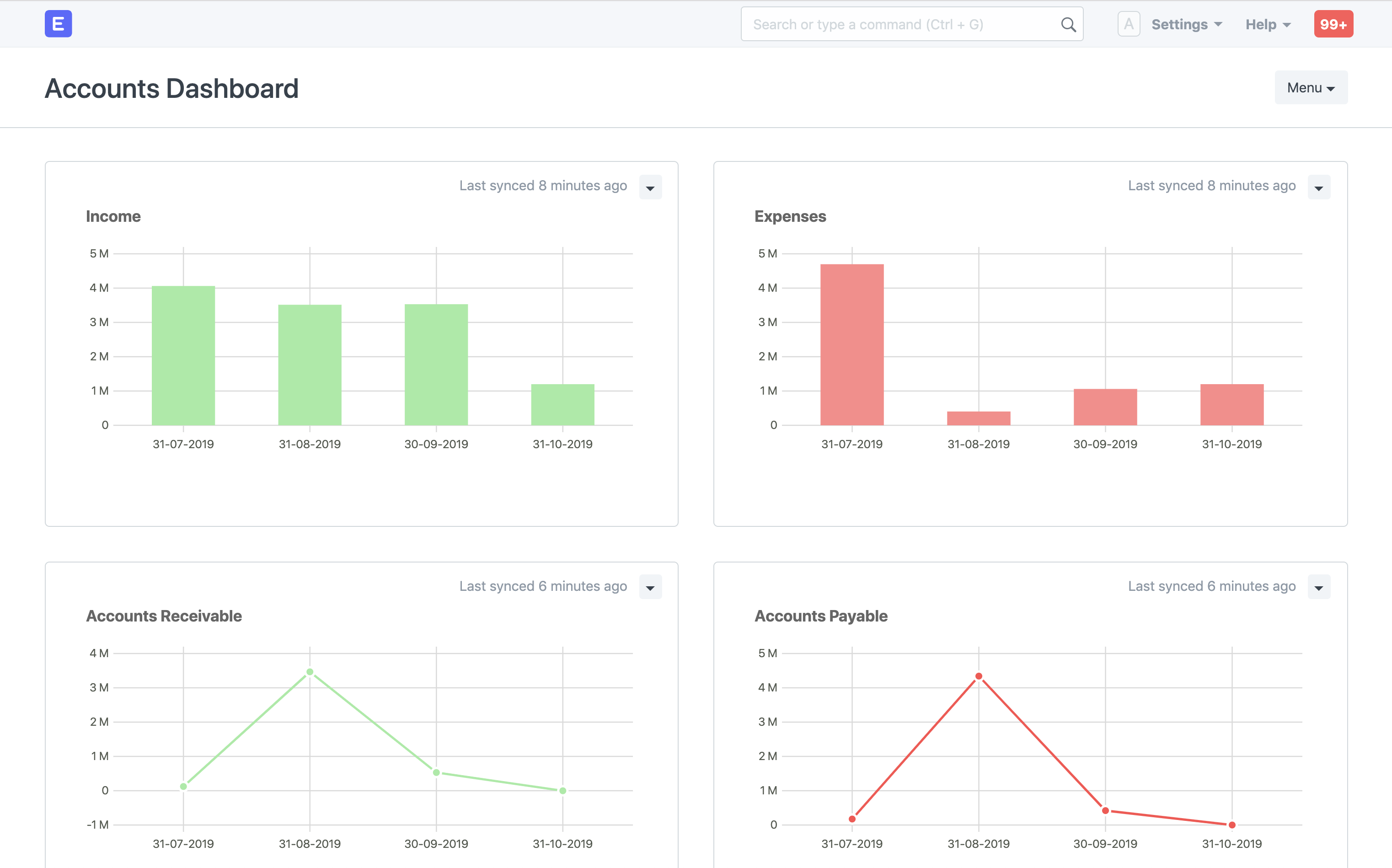
Sales Management
ERPNext’s Sales Management feature provides businesses with a complete toolkit to manage the entire sales cycle more efficiently. Some key features of this module include:
Customer Management
-
- : Allows businesses to set up and manage customer profiles, including contact information, shipping and billing addresses, and account balances.
Quotation and Sales Order: Create and configure quotations and sales orders with pricing, taxes, and shipping rules.
Sales Invoicing: Allows businesses to create and manage invoices for sales transactions, including the ability to track payments and account balances.
Delivery Note and Packing Slip: Allows businesses to create and manage delivery notes and packing slips, which are used to track the movement of goods from the warehouse to the customer.
Sales Pipeline: Allows businesses to track the sales pipeline, including the ability to view and manage leads, opportunities, and customer interactions.
Sales Reports: Allows businesses to generate and analyze sales reports, such as sales by customer, sales by item, and sales by salesperson.
Commission management: Allows businesses to track and manage commission on sales, including the ability to configure commission rates and track the performance of salespeople.
These features together allow businesses to have a clear view of their sales performance and to make data-driven decisions on how to improve their sales process and strategy.
Purchase Management
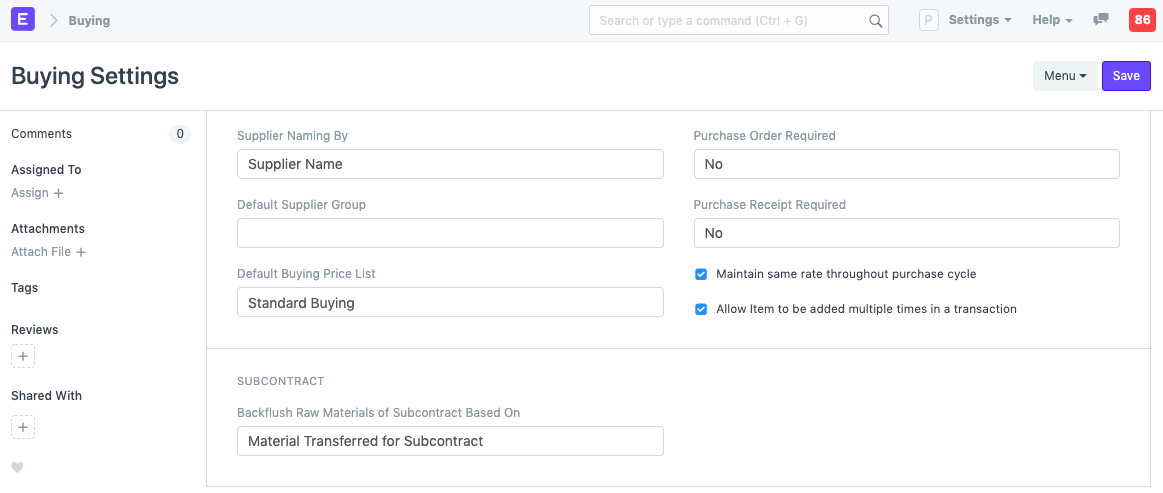
ERPNext’s Purchase Management feature helps businesses control procurement processes and strengthen supplier relationships. Some key features of this module include:
Supplier Management
-
- : Allows businesses to set up and manage supplier profiles, including contact information, shipping and billing addresses, and account balances.
Request for Quotation and Purchase Order: Allows businesses to create and manage requests for quotations and purchase orders, including the ability to configure pricing, taxes, and shipping costs.
Purchase Invoicing: Allows businesses to create and manage invoices for purchase transactions, including the ability to track payments and account balances.
Purchase Receipt and Goods Received Note: Allows businesses to create and manage purchase receipts and goods received notes, which are used to track the movement of goods from the supplier to the warehouse.
Purchase Pipeline: Allows businesses to track the purchase pipeline, including the ability to view and manage leads, opportunities, and supplier interactions.
Purchase Reports: Allows businesses to generate and analyze purchase reports, such as purchase by supplier, purchase by item, and purchase by department.
Quality Inspection: Allows businesses to inspect the quality of goods received from suppliers and thus to make sure that the goods are of the expected quality and standards.
These features together allow businesses to have a clear view of their purchase performance and to make data-driven decisions on how to improve their purchase process and strategy.
Inventory Management
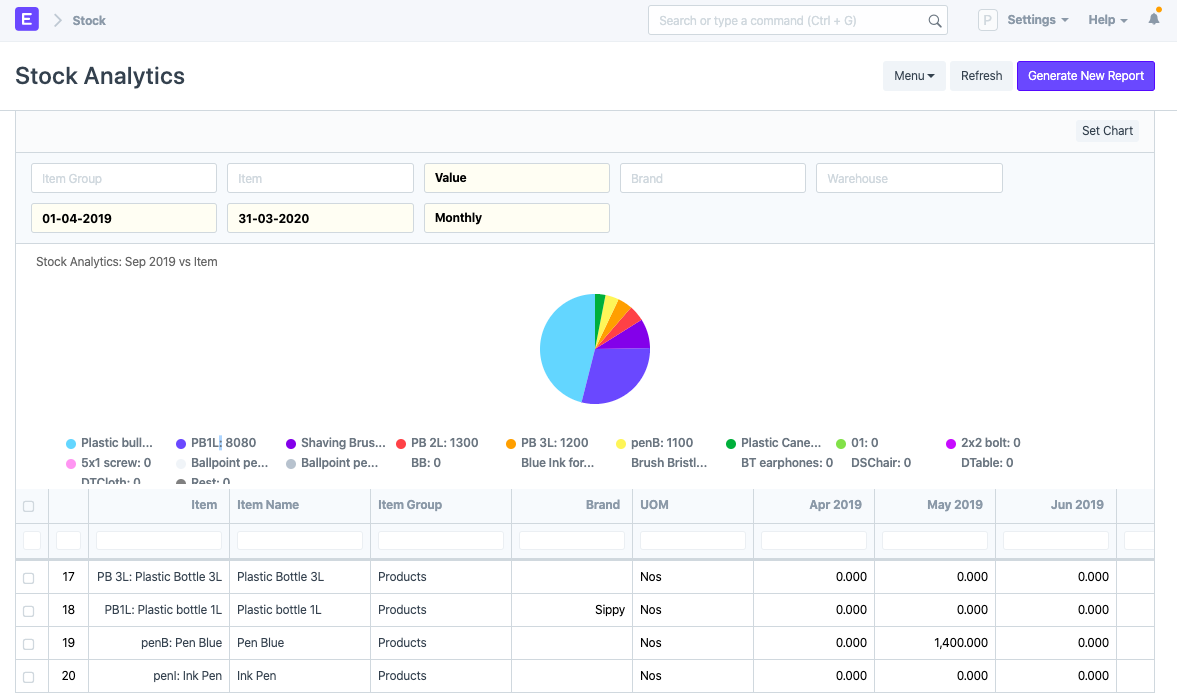
ERPNext’s Manufacturing Management feature provides businesses with a comprehensive set of tools for managing their manufacturing operations. Some key features of this module include:
Bill of Materials (BOM)
-
- : Allows businesses to create and manage bill of materials for manufactured products, including the ability to track the components and raw materials required for each product.
Work Orders: Allows businesses to create and manage work orders for manufactured products, including the ability to track the progress of each work order, and the ability to assign work orders to specific employees or departments.
Production Planning: Allows businesses to plan and schedule production runs, including the ability to track capacity and availability of resources.
Quality Control: Allows businesses to manage quality control processes, including the ability to track defects and non-conformances, and the ability to implement corrective and preventive actions.
Costing: Allows businesses to track and analyze the costs associated with manufacturing, including the ability to track direct and indirect costs, and the ability to analyze variances.
Manufacturing Reports: Allows businesses to generate and analyze manufacturing reports, such as production efficiency, production costs, and production schedule.
Time and Attendance: Allows businesses to track and manage employee time and attendance, including the ability to track employee hours and overtime, and the ability to assign employee costs to specific products.
Machine and Equipment Management: Allows businesses to track and manage machines and equipment used in the manufacturing process, including the ability to track machine availability and maintenance schedules.
These features together allow businesses to have a clear view of their manufacturing performance, and to make data-driven decisions on how to improve their manufacturing processes, reduce costs and increase efficiency. It helps in having better control over the production process and thus can help in better delivery of products.
Project Management
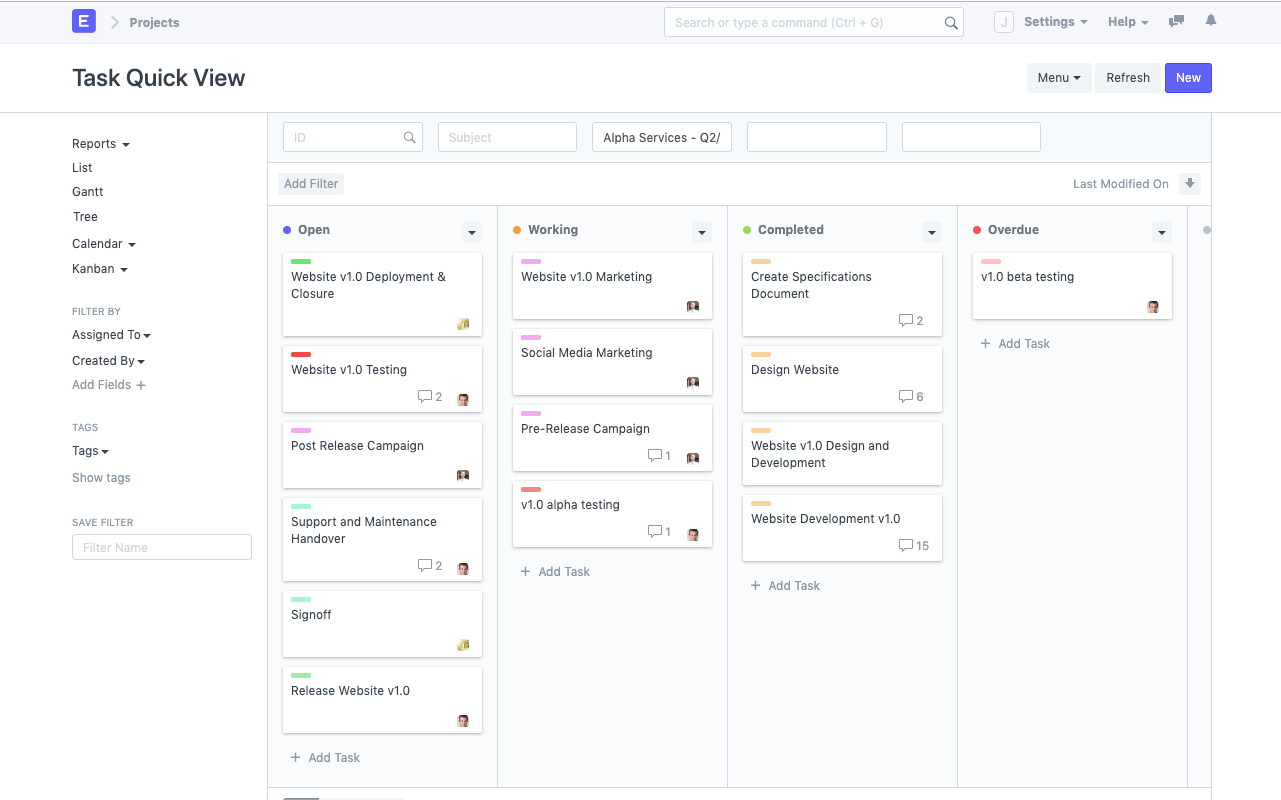
ERPNext’s Project Management feature provides businesses with a comprehensive set of tools for managing projects and tasks. Some key features of this module include:
Project Planning
-
- : Allows businesses to plan and schedule projects, including the ability to create work breakdown structures, set project milestones and deadlines, and assign tasks to team members.
Task Management: Allows businesses to create and manage tasks, including the ability to track task progress, set task priorities, and assign tasks to team members.
Time and Expense Tracking: Allows businesses to track time and expenses incurred on projects, including the ability to track employee hours and assign costs to specific projects or tasks.
Gantt Chart: Allows businesses to view project progress and timelines in a Gantt chart, making it easy to identify delays and plan accordingly.
Document Management: Allows businesses to store and share project-related documents, including the ability to version control and collaborate on documents.
Project Reports: Allows businesses to generate and analyze project reports, such as project progress, project costs, and project timelines.
Collaboration: Allows businesses to collaborate and communicate with team members, including the ability to assign tasks, share documents, and communicate through comments and discussion threads
Resource Management: Allows businesses to manage resources, including the ability to track resource availability, allocate resources to projects, and plan resource utilization
These features together allow businesses to have a clear view of their project performance and to make data-driven decisions on how to improve their projects, reduce costs, and increase efficiency. It helps in better coordination and communication among team members.
Human Resources Management
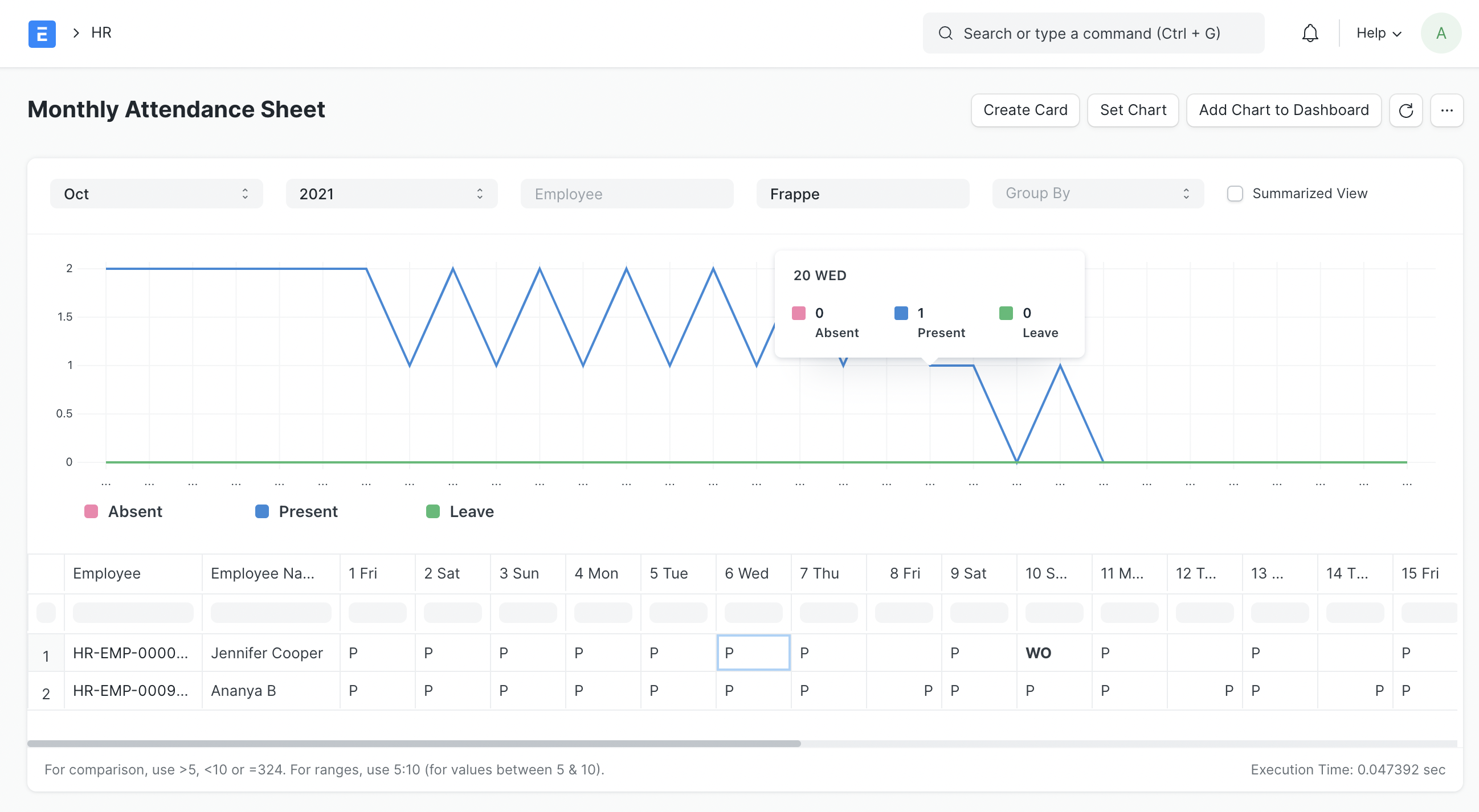
ERPNext’s Human Resource Management (HRM) feature provides businesses with a comprehensive set of tools for managing their employees. Some key features of this module include:
Employee Management
-
- : Allows businesses to store and manage employee information, including personal details, job information, and salary details.
Attendance and Leave Management: Allows businesses to track employee attendance and leave, including the ability to set leave policies, approve leave requests, and calculate leave balances.
Payroll Management: Allows businesses to manage payroll, including the ability to calculate employee salaries, generate payslips, and create payroll reports.
Employee Self-Service: Allows employees to access their personal information and request leave through an employee portal, reducing the workload on HR staff.
Recruitment Management: Allows businesses to manage the recruitment process, including the ability to post job openings, track candidates, and schedule interviews.
Performance Management: Allows businesses to evaluate employee performance, including the ability to set performance goals, provide feedback, and evaluate employee performance.
Training Management: Allows businesses to manage employee training, including the ability to schedule training, track employee progress, and evaluate training effectiveness.
Compliance Management:Allows businesses to ensure compliance with labor laws and regulations, including the ability to track employee data and generate reports for compliance audits.
These features together help businesses improve employee engagement, streamline HR processes, and ensure compliance with labor laws and policies.
ERPNext can also be customized to suit the unique needs of a business through its framework and API, and can be integrated with other systems such as e-commerce platforms and CRM systems. With this flexibility, ERPNext becomes a future-ready solution that grows with your business.
If you are interested in learning more about our ERPNext hosting services, you can view our dedicated ERPNext hosting page here:: https://www.soladrive.com/erpnext/



